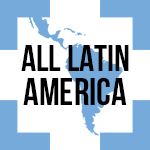This article was written by David Gagne and originally published by Insight Crime, a leading Medellín-based publication covering organized crime in Latin American and the Caribbean. It has been republished with permission.
Latin American civil society groups are attempting to turn “war on drugs” logic on its head by assessing the damaging effects of repressive drug policies on human rights rather than judging success by international security standards.
A sweeping new report (pdf) by 17 organizations across Latin America, the United States and Canada calls attention to how drug policies have infringed on human rights. The study covers a wide range of issues, from lengthy prison sentences for minor drug offenders to prohibitive drug policies that run counter to international human rights and highlights how harsh drug policies often have a disproportionate effect on the most vulnerable sectors of society.
Luciana Pol, a drug policy expert at the Argentine organization that compiled the report, the Center for Legal and Social Studies (CELS), says the issue first came to their attention after seeing the impact drug legislation has had on prison populations in Latin America.
“Almost eight years ago, we started visiting women’s prisons because of research we were doing on violence inside detention centers,” Pol told InSight Crime. “Without looking for the issue of drug policy and its impact on prisons, we saw it right in front of us.”
Many other organizations based in the region have noticed a similar dynamic during the course of their regular advocacy work, Pol added. Approximately 30 percent of all inmates in most Latin American countries are incarcerated on drug-related charges, she said.
The evaluation of drug policy through a human rights lens is just beginning to garner serious attention in the region, the report states.
“The so-called ‘War on Drugs’ deployed in the last 50 years has had an enormous impact on the functioning of security, justice and prison systems in Latin America,” it reads. “Despite the high levels of violence that this battle has caused in some areas and its grave consequences, for many years it was not analyzed from a human rights perspective in local or international arenas. This scenario has begun to change.”
InSight Crime Analysis
The joint report reflects the growing sentiment within Latin America that the militarization of security forces and emphasis on supply-side reduction as part of the US-backed “war on drugs” has failed. The report itself was written in response to the first ever hearing by the Inter-American Commission on Human Rights on how drug policy has impacted human rights in the region, which was held in March 2014.
Support for a new approach to dealing with the issue of illicit drugs has been building in recent years. Uruguay became a global pioneer in 2013 when it legalized the marijuana industry, while Guatemala, Jamaica, Mexico and others have also shown signs of breaking away from the drug policy model traditionally backed by the United States and the United Nations. Even Colombia, a key US security ally in the region, has decriminalized possesion of personal doses and called on the UN to re-evaluate international drug norms.
“There are two things happening,” Pol said, in explaining Latin America’s declining support for traditional approaches to combating illicit drugs. “First, these countries are realizing that the policies are failing. Second, they are starting to question what are the best measures of success.”
It’s unclear whether this regional momentum will translate into global shifts in drug policy norms. In April 2016, the United Nations will hold a special session, known as UNGASS, to discuss the world’s drug control priorities. But a universal consensus on how to deal with this issue remains far off.
“Many of the drug policy reforms formulated in Latin America or Western Europe are likely to struggle for support at UNGASS 2016,” reads an April 2015 Brookings report (pdf) on global drug perspectives. “Such measures often find very limited support in Asia, including China, Thailand, and Vietnam; there is strong opposition in Russia, and at best ambivalence in much of Africa.”
What’s more, the drug reform movement has yet to build a consensus within Latin America. The report points out that drug-related penalties are still disproportionately high in countries like Bolivia, where the maximum sentence for drug trafficking (25 years) exceeds that of murder (20 years). Cuban law even permits authorities to punish drug traffickers with the death penalty.
Pol suggests that characterizing prohibitive drug policies in the region as being purely driven by external forces would be a mistake.
“We cannot say this is an active imposition on Latin American countries,” Pol said. “If you analyze the domestic situation, most countries have embraced this view, and they have acted accordingly.”
The path towards drug policy reform in Latin America remains fraught with obstacles. But a closer examination of how these policies are weakening Latin America’s state institutions and societies and violating the human rights of its citizens makes it abundantly clear that the status quo should no longer be acceptable.


